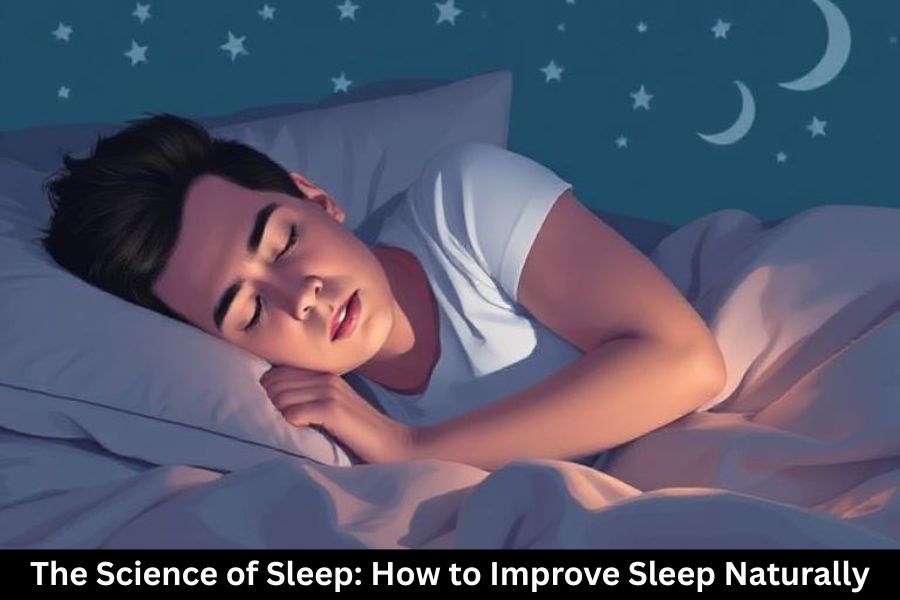Sleep isn’t just a time when your body shuts down—it’s your natural reset button. While you sleep, your brain sorts information, your muscles repair, and your immune system recharges. Think of sleep as the silent guardian of your health. Without it, everything from your mood to your metabolism takes a hit.
How Much Sleep You Really Need
While everyone’s needs differ, most adults need 7–9 hours of sleep each night. Kids and teens may require even more. Missing out regularly can lead to chronic fatigue, weakened immunity, and even long-term diseases.
Understanding the Sleep Cycle
REM vs. Non-REM Sleep
Your sleep is divided into two main phases: REM (Rapid Eye Movement) and Non-REM. Non-REM includes deep, restorative sleep, while REM is linked to dreaming and emotional processing. You cycle through these stages multiple times each night.
How Sleep Stages Impact Health
Deep sleep strengthens memory, boosts cell repair, and balances hormones. REM sleep helps you process emotions and enhances creativity. Missing either one can leave you groggy or emotionally drained.
The Role of Circadian Rhythm
Your circadian rhythm acts like your body’s natural clock. It tells you when to feel awake and when to feel tired. Light exposure, routines, and lifestyle habits can either support or disrupt this rhythm.
Common Causes of Poor Sleep
Stress and Anxiety
Stress is the enemy of peaceful sleep. Racing thoughts, worries, or emotional overload can keep your body stuck in “alert mode.”
Poor Sleep Hygiene
Irregular bedtimes, uncomfortable bedrooms, and late-night eating can derail your sleep faster than you think.
Lifestyle Factors
Caffeine, lack of exercise, and excessive screen time all chip away at your sleep quality.
Natural Ways to Improve Sleep
Maintaining a Consistent Sleep Schedule
Going to bed and waking up at the same time daily—even weekends—helps regulate your internal clock. Your body loves consistency.
Creating a Sleep-Friendly Environment
A cool, dark, and quiet room works wonders. Think of your bedroom as a cave designed for comfort and rest. Soft bedding, blackout curtains, and a supportive mattress can make all the difference.
Limiting Screen Time
Phones and laptops emit blue light that tricks your brain into thinking it’s daytime.
Blue Light and Its Effects
Blue light suppresses melatonin—the sleep hormone. This makes it harder to fall asleep and stay asleep. Limiting screens one hour before bed helps restore natural melatonin production.
Relaxation Techniques
Breathing exercises, stretching, meditation, or even reading a book can calm your mind and prepare your body for rest.
Nutrition and Sleep
Foods That Help You Sleep
Certain foods naturally support relaxation and melatonin production. These include:
- Cherries
- Almonds
- Warm milk
- Bananas
- Herbal teas
What to Avoid Before Bed
Heavy meals, spicy foods, and sugary snacks can keep you awake or cause indigestion.
The Role of Caffeine and Sugar
Caffeine stays in your system for hours—sometimes up to 10! Sugar can cause energy spikes that disrupt sleep patterns.
Physical Activity and Sleep
Best Times to Exercise for Better Sleep
Exercise improves sleep quality, but timing matters. Morning or early evening workouts are ideal. Working out too close to bedtime can overstimulate your system.
How Movement Supports Sleep Quality
Physical activity reduces stress, balances hormones, and promotes deeper sleep cycles.
Natural Supplements and Remedies
Melatonin
Melatonin can help regulate sleep-wake cycles, especially if your schedule is off or you travel often.
Magnesium
Magnesium relaxes muscles and calms the nervous system. It’s often used for reducing nighttime anxiety.
Herbal Teas and Essential Oils
Chamomile tea, lavender oil, and valerian root are popular natural sleep aids.
Building Healthy Nighttime Rituals
Creating a Pre-Sleep Routine
Maybe it’s a warm shower, a cup of herbal tea, or journaling. What matters is signaling your brain that it’s time to unwind.
The Power of Mindfulness
Mindful breathing, gratitude practices, and gentle meditation help release tension and calm an overactive mind.
When to Seek Professional Help
Signs of Sleep Disorders
If you consistently struggle to fall asleep, wake up gasping, or feel exhausted despite sleeping long hours, it may indicate a sleep disorder.
What a Sleep Specialist Can Do
A professional can identify issues like sleep apnea, insomnia, or restless leg syndrome and offer treatment plans.
Conclusion
Quality sleep isn’t a luxury—it’s a necessity. Understanding the science behind sleep can help you make smarter choices that naturally enhance your rest. From creating a relaxing bedtime routine to adjusting your habits and environment, small changes can lead to profound improvements. Better sleep leads to better days, clearer thinking, and a healthier you.
FAQs
1. What is the quickest natural way to fall asleep?
Practicing deep breathing or a short meditation can calm your mind and help you drift off faster.
2. Does drinking warm milk actually help?
Yes, milk contains tryptophan, a sleep-supporting amino acid.
3. How long before bed should I stop drinking caffeine?
At least 6–8 hours before bed to avoid interruptions in sleep.
4. Can exercise really improve sleep quality?
Absolutely—regular physical activity supports deeper and more restful sleep.
5. How do I know if I have a sleep disorder?
Persistent insomnia, loud snoring, or extreme daytime fatigue are common signs that warrant professional evaluation.

